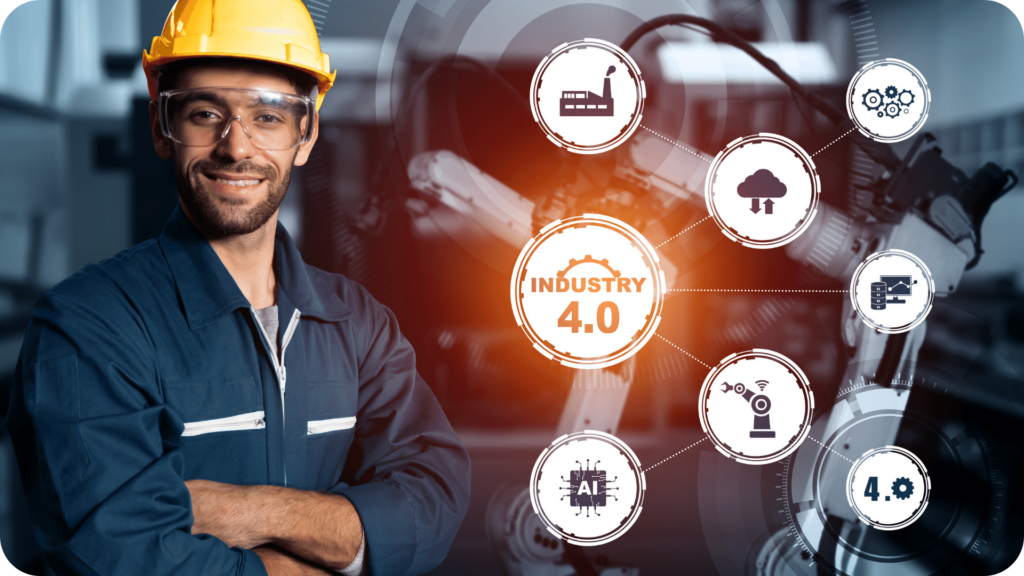Modernizing Manufacturing with Industry 4.0 & Smart Factory

Introduction
The manufacturing industry has seen tremendous transition in recent years, thanks to the rise of Industry 4.0. The fourth industrial revolution is defined by the combination of digital technology and enhanced automation to build smart, linked production facilities. This connection provides real-time communication, remote monitoring, and data collecting, allowing manufacturers to achieve an unparalleled level of quality, dependability, and agility.
One of the most significant advantages of Industry 4.0 is that it makes current technologies such as ERP (Enterprise Resource Management) and Manufacturing Execution System (MES) more powerful than before. This results in improved process control, more effective and proactive production operations, and the ability for staff to fulfill their duties from anywhere.
Industry 4.0 technologies provide more flexible and responsive operations that can react to changing market circumstances and customer demands.
Technologies that Support Industry 4.0
The introduction of many technologies that have changed traditional industrial procedures has made Industry 4.0 conceivable. These technologies are intended to improve efficiency and production in industrial areas by allowing for speedier decision-making. Some of the major technologies that assist Industry 4.0 are as follows:
- Artificial Intelligence
Artificial Intelligence has changed the industrial industry by enabling computer systems to execute activities that previously needed human intellect. AI is used by manufacturers to forecast equipment failures, alter maintenance schedules accordingly, execute quality control inspections, and manage supply chain concerns. AI in manufacturing can help manufacturers reduce expenses, enhance accuracy, and optimize processes.
- Internet of Things (IoT)
IoT technology connects physical items such as sensors and actuators to the internet and is used for real-time monitoring by collecting and transferring data from equipment and machines. The Internet of Things enables manufacturers to collect and analyze data from a variety of sources, boosting decision-making processes and resulting in improved outcomes.
- Cloud Computing
Cloud computing enables the supply of computer services and data storage through the internet, allowing for the analysis of massive volumes of data. Manufacturers can utilize cloud computing to analyze data in real-time, reducing decision-making time and improving operational efficiency.
- Analytics and Big Data
Big data and analytics enable producers to analyze massive amounts of data generated by various equipment, devices, and sensors. This aids in the identification of trends and patterns in data, providing more insight into specific circumstances or issues. In industrial operations, big data and analytics are frequently utilized to uncover correlations between factors that impact a production process.
- Virtual Reality, Augmented Reality, and Mixed Reality
AR, VR, and MR are a group of technologies that integrate real and virtual surroundings, as well as computer-generated human-machine interactions. In the industrial sector, this technology is utilized to improve training and visualization of production or maintenance operations. It can drastically boost staff training and significantly contribute to completing manual activities remotely.
- Additive Manufacturing
The method of constructing 3D items layer by layer from a digital file is known as additive manufacturing. This technique is commonly used during the product design stage to make prototypes or, during the execution stage, to create bespoke components without having huge amounts of inventory. Manufacturers can utilize additive manufacturing to create items with complicated geometries that would be impossible to fabricate using standard methods.
Industry 4.0, a revolution in the manufacturing industry?
Industry 4.0 is transforming the manufacturing sector by integrating innovative technology and ideas that enable a smarter and more efficient production process. The changes brought about by Industry 4.0 are considerable and can be classified as follows:
- Data gathering and monitoring using sensors
The utilization of sensors, which enable real-time monitoring and data collection from every piece of equipment in a facility, is a major component of Industry 4.0. This data is then analyzed to give significant insights for maintenance, process control, inventory management, and people management decision-making. Older machinery can be updated to operate with sensors in order to reap the benefits of data monitoring.
- Expanded communication between equipment and systems
Industry 4.0 has resulted in the development of a fully networked facility in which every equipment feeds data into software systems. This enables better informed macro and micro decision-making, leading in greater efficiency, safety, and production. As 5G technology becomes more widely used, This networking technology will play an even larger role in the path ahead of Industry 4.0.
- More advanced automation
While automation is not new to the industrial business, industry 4.0 advances automation technologies. This technology allows for more informed programming, new ways for humans and robots to collaborate, and overall efficiency, safety, and productivity.
- Data analytics and action
The huge amount of data acquired in real-time by sensors and other monitoring technologies enables more effective process management through fine-tuning and modification. Industry 4.0 also introduces more reliability-focused manufacturing, such as predictive production, which reduces downtime, enhances productivity, and keeps shop floors running at optimal performance.
How does Smart Factory MOM align with Industry 4.0?
As we’ve seen, industry 4.0 is reshaping the manufacturing business by embracing technologies like AI, IoT, big data, and automation to boost efficiency, productivity, and innovation. Smart Factory MOM is an important component of Industry 4.0 because it allows producers to gather, analyze, and act on data in real-time across the whole manufacturing process.
Smart Factory MOM collects and analyzes data from a variety of sources, including sensors, machines, and human operators, to offer real-time visibility and control over manufacturing activities. This allows producers to enhance production efficiency, decrease downtime, and improve quality by recognizing and fixing concerns before they become problems.
The Smart Factory solution is an important part of Industry 4.0, giving businesses the tools they need to achieve digital transformation and optimize their production processes. Here are some of the ways Smart Factory MOM integrates into the Fourth Industrial Revolution:
- Cloud-based service
Smart Factory MOM is a cloud-based system that delivers increased adaptability, flexibility, scalability, and data protection to manufacturing organizations of all sizes and locations.
- Use of IoT, machine learning, and predictive analytics.
To optimize and increase production efficiency, Smart Factory MOM uses advanced technologies such as IoT, machine learning, and predictive analytics. Manufacturers can utilize these technologies to gather, analyze, and act on data in real time, boosting decision-making and operational efficiency.
- Effective resource allocation
Makes use of a Siemens-powered advanced planning and scheduling (APS) engine to deliver optimal resource scheduling. This guarantees that resources are used properly and efficiently, resulting in increased production and less downtime.
- Data capture and tracking in real time
Collects and tracks data on employees, equipment, and work orders in real time. This guarantees that the production process is continuously monitored and managed, giving producers total visibility into their operations.
- Automatic data collection
Automate data capture from machines and other devices, enabling Industry 4.0 connection. This reduces the need for human data entry, lowering mistakes and increasing efficiency.
- Analysis of industrial performance at the highest level
Delivers world-class factory performance analysis with loss visualization right out of the box. This provides manufacturers with immediate visibility into their production operations, allowing them to discover areas for improvement and immediately implement changes.
- Paperless shop floor
With downtime warnings and collaborative communications, Smart Factory provides a paperless shop floor, reducing waste and streamlining procedures. As a result, the production process becomes more efficient and sustainable.
Smart Factory MOM functionalities
Smart Factory MOM has a wide range of features and functionalities that make it the obvious option for the manufacturing business. Some of its amazing features and functions are as follows:
- MES (Manufacturing Execution System/Suite)
- Advanced Planning
- Production Control
- Asset Performance Monitoring
- OMS (Operating Method Sheets)
- Syncing Data in Real Time
- Personnel Management
- Real-Time Analytics
- Immediate Notifications for Efficient Communication
- Easy-to-Access Training
Last Thought
The global smart manufacturing market is expected to grow from $277.81 billion (in USD) in 2022 to $658.41 billion in 2029 at a CAGR of 13.1%.
Smart Factory MOM is at the forefront of this revolution as Industry 4.0 transforms the manufacturing industry in new ways. It offers manufacturers with the tools they need to fulfill their production objectives, eliminate waste, and boost profitability with cloud-based solutions, modern technology, smart resource scheduling, and world-class performance analysis. It will likely play an increasingly crucial role in moving the industry forward as manufacturers continue to adapt to this new paradigm.
Take the next step towards optimizing your manufacturing operations and embrace the future of manufacturing and service operations management with Smart Factory MOM solution.
Contact us today at KaarTech to learn how this solution can revolutionize your operations and drive your success in the digital age.
FAQ’s
What is manufacturing analytics?
Manufacturing analytics, a key component of Industry 4.0, refers to the utilization of operational systems and machine data to improve the activities of a manufacturing organization. This data has the potential to improve productivity and performance, assure product quality, optimize decision-making, and save costs.
What are the advantages of intelligent manufacturing?
Some of the key advantages of smart manufacturing are increased efficiency, leaner processes, maximum flexibility, increased agility, innovation, and higher-quality goods.
Why is Industry 4.0 important?
This technology enables you to control and optimize your production and supply chain operations. It gives real-time data and insights to assist you make better business decisions, enhancing the productivity and profitability of your organization.
What is the goal of Industry 4.0?
The major goal is to accelerate manufacturing by making it quicker, more efficient, and customer-centric. Also, look beyond automation and optimization for new business opportunities and models.

